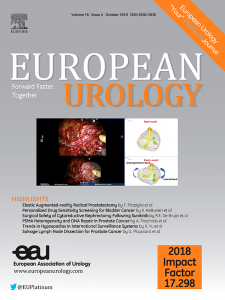Urine Tumor DNA to Stratify the Risk of Recurrence in Patients Treated with Atezolizumab for Bacillus Calmette-Guérin–unresponsive Non–muscle-invasive Bladder Cancer
IF 25.3
1区 医学
Q1 UROLOGY & NEPHROLOGY
引用次数: 0
Abstract
As new treatments for bacillus Calmette-Guérin (BCG)-unresponsive non–muscle-invasive bladder cancer (NMIBC) emerge, better methods are needed to guide therapeutic decisions. This study analyzed urine tumor DNA (utDNA) from patients treated with atezolizumab in the SWOG S1605 trial to determine whether utDNA profiling can stratify the risk of treatment failure. Urine samples were analyzed using the UroAmp assay at baseline and 3 mo from 89 and 77 patients, respectively. Only 13% of UroAmp-positive patients at baseline achieved a complete response at 6 mo compared with 71% of UroAmp-negative patients (p < 0.001). The 18-mo event-free survival (EFS) was significantly lower for UroAmp-positive patients at baseline (23%) than for UroAmp-negative patients (51%; hazard ratio [HR] 2.8, p < 0.001). Among patients with no clinical evidence of disease at 3 mo (n = 51), the 18-mo EFS was 38% for UroAmp-positive and 86% for UroAmp-negative (HR 3.5, p = 0.01) patients. These findings suggest that utDNA profiling at baseline and after 3 mo of treatment can help identify patients with BCG-unresponsive NMIBC who are less likely to benefit from systemic immunotherapy.尿肿瘤DNA对阿特唑单抗治疗卡介苗-谷氨酰胺无反应的非肌肉侵袭性膀胱癌患者复发风险的分层
随着卡介苗(BCG)无反应性非肌肉浸润性膀胱癌(NMIBC)新疗法的出现,需要更好的方法来指导治疗决策。本研究在SWOG S1605试验中分析了atezolizumab治疗患者的尿肿瘤DNA (utDNA),以确定utDNA分析是否可以对治疗失败的风险进行分层。分别在基线和3个月时使用UroAmp分析89例和77例患者的尿液样本。基线时只有13%的uroamp阳性患者在6个月时获得完全缓解,而uroamp阴性患者的这一比例为71% (p <;0.001)。基线时,uroamp阳性患者的18个月无事件生存率(EFS)(23%)显著低于uroamp阴性患者(51%;风险比[HR] 2.8, p <;0.001)。在3个月无临床疾病证据的患者中(n = 51), 18个月的EFS在uroamp阳性患者中为38%,在uroamp阴性患者中为86% (HR 3.5, p = 0.01)。这些发现表明,基线和治疗3个月后的utDNA分析可以帮助识别不太可能从全身免疫治疗中获益的bcg无反应的NMIBC患者。
本文章由计算机程序翻译,如有差异,请以英文原文为准。
求助全文
约1分钟内获得全文
求助全文
来源期刊

European urology
医学-泌尿学与肾脏学
CiteScore
43.00
自引率
2.60%
发文量
1753
审稿时长
23 days
期刊介绍:
European Urology is a peer-reviewed journal that publishes original articles and reviews on a broad spectrum of urological issues. Covering topics such as oncology, impotence, infertility, pediatrics, lithiasis and endourology, the journal also highlights recent advances in techniques, instrumentation, surgery, and pediatric urology. This comprehensive approach provides readers with an in-depth guide to international developments in urology.
 求助内容:
求助内容: 应助结果提醒方式:
应助结果提醒方式:


